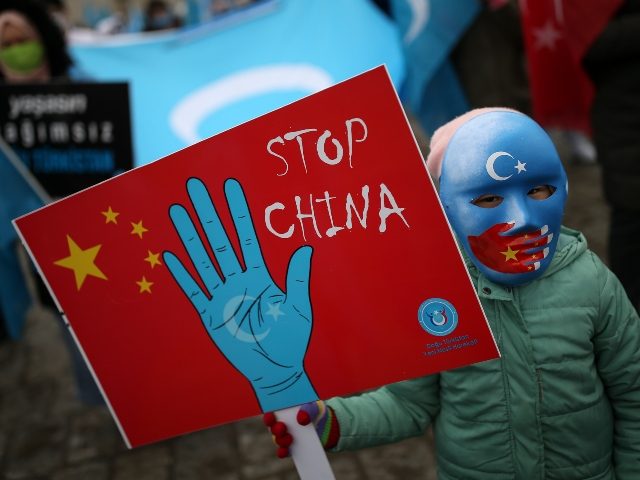China’s state-run Global Times on Thursday complained that the free world does not understand the genocidal, oppressive, slave-taking Chinese Communist Party’s unique “concept” of human rights — a failure of understanding that might be corrected with more propaganda to “promote mutual learning between China and the West.”
The Global Times excitedly reported on a symposium of “well-known Chinese and foreign experts” on human rights, with the goal of developing better methods of expressing that very special Chinese Communist perspective on human rights:
The symposium adopted the combination of both online and offline, and invited seven well-known Chinese and foreign experts and scholars to have in-depth discussions on topics including the concept and achievements of China’s human rights development, China’s participation in global governance of human rights, and mutual learning on human rights between China and the West, the China News Service reported.
Chen Junjun, president of China News Service, said at the symposium that human rights have increasingly become the focus of the international community, and theories and practices of human rights in different countries are showing different results, which also provides opportunities and impetus for the sound development of the international human rights cause.
“China has historically solved the problem of absolute poverty and guaranteed the basic rights of its people in just a few decades,” said Lu Guangjin, Secretary-General of the China Society for Human Rights Studies (CSHRS) and professor of the Law School at Jilin University. The historic achievements made in the development of China’s human rights cause have proved the scientific and rationality of China’s human rights development path.
Outsiders looking at the abject tyranny of the unelected regime in Beijing, its vicious suppression of political dissent, and its vast network of concentration camps and forced labor programs for inconvenient minorities might wonder where this historic progress on human rights is hiding.
As the remarks by Lu and other “experts” at the symposium indicate, China’s “concept” of human rights is purely collective in nature. The good of the State is equivalent to the good of the people; if most of the population seems to be avoiding poverty and starvation, the rights and dignity of individuals are entirely irrelevant.
“The progress of China’s human rights is a new breakthrough in the realization of the international human rights cause, and it has also expanded the inherent development path of human rights in the world since the 20th Century,” the Global Times boasted, which is true in the sense that nations less oppressive than China can feel better about themselves by studying the horror show in Beijing.
Of course, the symposium included an apparatchik tasked with downplaying China’s hideous abuse of the Uyghur Muslims:
In response to the concerns of some Western countries over the human rights issue in Xinjiang Uygur Autonomous Region, Zuliyati Simayi, vice-president of Xinjiang University and Dean of the School of Marxism, said, “Growing up in Xinjiang, I have seen with my own eyes a vivid picture of ethnic groups living a better life because of their hard work. All ethnic groups in Xinjiang are free to work and live a happy life and there is no such thing as forced labor.”
The cast was rounded out with a few useful Western academics who pushed China’s line that it simply has different cultural “traditions” that yield a different, but equally valid and enlightened, understanding of what “human rights” mean.
Taken in sum, China’s human-rights symposium was the latest propaganda construct to downplay Beijing’s abuses, giving foreign political and business leaders a pre-packaged argument for setting aside their concerns about human dignity to do business with the Chinese Communist Party.
The symposium also laid the groundwork for spinning the upcoming visit to East Turkistan, the Uyghur homeland China calls Xinjiang, by U.N. Human Rights Commissioner Michelle Bachelet.
Bachelet’s office in Geneva said on Thursday she will spend “six to seven days” in China, including a visit to Xinjiang and meetings with “senior government officials.” The date of her arrival was not confirmed, but it will most likely be sometime next week.
Human rights activists fear Bachelet’s visit will be stage-managed into a “propaganda minefield laid out by the Chinese Communist Party,” as over 200 groups said in an open letter published on May 5.
The open letter criticized Bachelet for failing to meet with “survivors from the Uyghur camps, Tibetan former political prisoners, or Chinese democracy activists linked to the Tiananmen Square massacre.” The groups urged Bachelet to visit Tibet and Hong Kong.

COMMENTS
Please let us know if you're having issues with commenting.